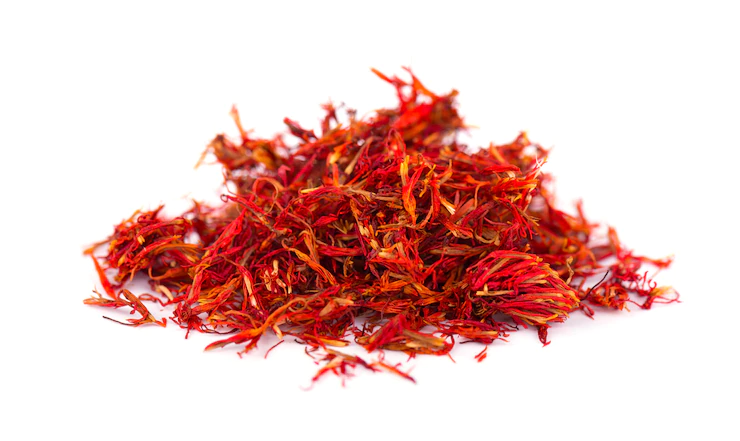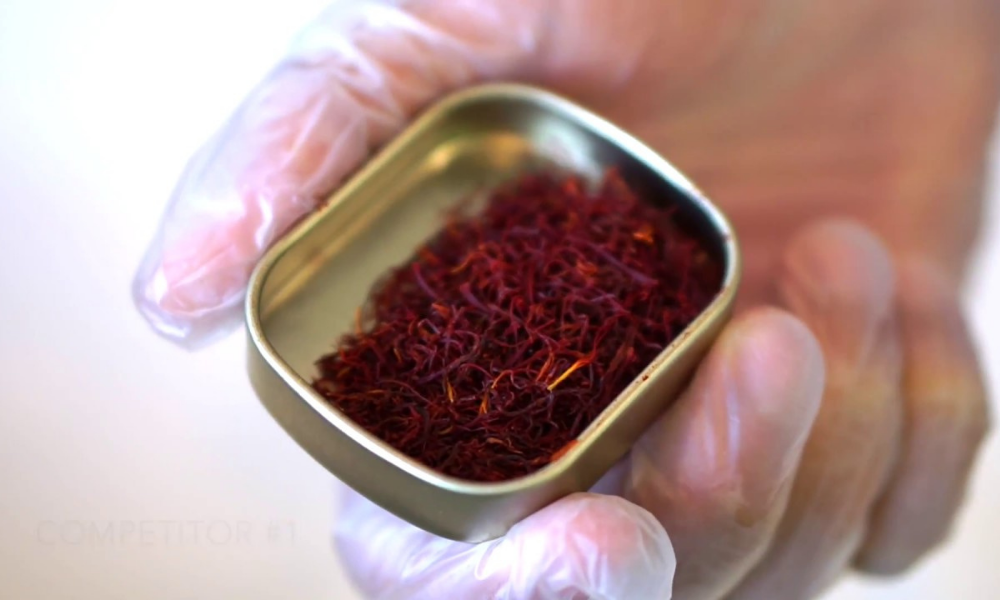Saffron, like all spices, expires. Like most spices, it gradually loses its effectiveness over time. It will be at peak quality for a year or two, depending on storage conditions (less if stored improperly), and then gradually degrade until it is unfit for cooking. Because saffron is dried, it is unlikely to decay or become unpleasant or off-putting. However, it is possible if it has been exposed to a lot of moisture.
Your saffron will most likely dry out slowly and change the texture. After a few months or even years of using spice, it’s easy to forget how fantastic it was at first. Plus, the lovely red-gold color saffron imparts to meals can deceive you into thinking your spice is still acceptable when it isn’t.
Saffron
The blue or purple crocus flower’s dried stigmas are used to make saffron. It’s been used as a seasoning and color for generations, and it’s also one of the most expensive spices by weight. Rice pilaf, risotto Milanese, paella Valenciana, and bouillabaisse Marseillaise all contain the red-orange threadlike threads.
Saffron can also be made into a liqueur called saffron liquor by mixing it with honey. Saffron prices fluctuate based on availability in different years. Still, it would help if you always bought it in modest quantities because it quickly loses its flavor—and color—once exposed to air or heat. Because saffron does not contain water, which causes most foods to expire, it has an endless shelf life. Saffron’s flavor and strength will decline over time, but this does not affect its quality. Saffron can be stored in a cool, dry place for two to three years before losing its flavor.
How to Tell If Saffron is Bad?
Because saffron has a distinct flavor, color, and aroma, it’s simple to tell if it’s gone wrong. Here’s how to tell if your saffron is still OK or if you should toss it:
- The expiration date for saffron might assist you in figuring out how fresh your spice is. If the stated sell-by date was more than three years ago, your saffron is most likely no longer effective, and it’s best to cut your losses and discard it.
- Saffron has a bright orange-red color. The spice’s vibrant color, in addition to its earthy overtones, is what makes it so enticing. It is no longer fresh if your saffron spice, whether powdered or whole, has lost its unique color and seems faded or dull. Likely, the spice won’t add the flavor or color you want to your recipe, and the saffron expiration date has passed!
- Saffron has a powerful aroma that is impossible to ignore when fresh. This prized spice has a distinct floral and earthy aroma with tobacco overtones. Checking for the presence of this distinct aroma is a great way to tell how fresh saffron is. Rub a small amount of saffron between your thumb and index finger to enhance the aroma.
- In-ground saffron, moisture penetration is widespread. Saffron powder will appear clumpy if moisture has gotten into it, and the threads will stick together rather than exist as distinct chunks. In soaked saffron, mold flourishes, making the spice unpleasant and unsafe to consume.
What is the Shelf Life of Saffron?
The spice’s ability to last is influenced by its quality, storage, and whether it’s whole or ground.
Let’s start with the essential factor: quality. Superior saffron is dried at high temperatures to extract as much moisture as possible, and saffron is more likely to produce germs and mold with more moisture, limiting its potency.
When buying saffron or spices, moisture content information is not on the label, but try to buy from high-quality and recognized spice sellers. Apart from that, whole saffron will last far longer and retain its aroma and flavor better than ground saffron. Finally, Saffron is sensitive to air, light, heat, and moisture, and if spices are kept free from these elements, they will stay longer.
If appropriately stored beyond the sell-by date, saffron threads will last 2 to 3 years. The duration will be lowered to 6 to 12 months if the saffron is ground. It’s worth mentioning that the harvest and purchase dates aren’t always the same. Saffron that has beyond its expiration date but shows no deterioration should be acceptable to use. However, the longer you store a spice, the less flavor and aroma it will have.
How to Store Saffron?
You have a lot of spices at home. Therefore you should know how to keep them, right? Maybe. However, because saffron is so valuable, you may want to take extra precautions. Also, unless you frequently make a meal that employs saffron, you’ll be replacing other spices far more frequently than you’ll be replacing saffron (but then why would you be asking for storage advice)
.In any case, don’t put your saffron in the refrigerator! Spices do not go in the refrigerator, but saffron is unique, and I can see a panic-refrigeration situation. Sure, the fridge is cool, but it’s also a damp environment, and because saffron is dried, it absorbs a lot of moisture from the air. Like most spices and many longer-lasting foods, Saffron prefers (say it with me.) a chilly, dark environment! If you don’t have a deep cabinet or pantry, wrap your saffron container in silver foil to block light and store it in an airtight container.
If my head weren’t screwed on, I’d lose it. Therefore I always store saffron in a larger container than it requires and clearly label it. When using saffron, keep the container away from the pot you’re adding spice to, as the heat and steam will harm the fronds you haven’t used yet. Instead, carefully select what you require and return the remainder to that cold, dark location as soon as possible.
Can you Freeze Saffron?
It may surprise you to learn that saffron can be frozen. Saffron is used and preserved in large amounts worldwide, even though it appears too fragile for the icebox. Because saffron keeps for a long time in the pantry, freezing it only makes sense if you’ve purchased it in bulk or don’t expect to use it for a long time. Pour the amount of saffron you want to freeze onto a paper towel and remove any impurities or poor threads before freezing.
This is especially relevant when buying saffron in quantity, as the little pots are usually well-sorted. Wrap the saffron in silver foil with care. Wrap it securely without leaving any cracks, but be careful not to crush it. Crushing is a quick technique to get it right, but it will damage your saffron and make unwrapping a pain. Put the silver foil packet in an airtight container at the end. This could be a heavy-duty freezer bag or a Tupperware with a tight-fitting top. If you’re using a freezer bag, make sure your freezer is set up correctly, so the saffron doesn’t get crushed. Put your saffron in the freezer, and when you need it, take out what you need and rewrap everything carefully.
How Long does Saffron Last?
Saffron, like most spices, is best utilized as soon as possible for maximum flavor and strength. It will also gradually lose its strength with time, so after two or three years, it will no longer be as aromatic or tasty as it was when it was fresh. However, both powdered saffron and saffron threads usually have a best-by date.
And, if you take good care of the spice, it will last for months, if not years, after the expiration date. If the packaging doesn’t have a date, you can presume it will keep most of its flavor for 2–3 years. Of course, as time passes, you may find that you need to add more of it to the food you’re preparing for it to taste as it should.
Conclusion
Saffron is arguably best recognized in the United States as a fundamental ingredient in paella, although it’s been used in cooking for decades throughout Europe, the Middle East, and Africa. It’s also a favorite among modern chefs who like to experiment with food. If you have saffron on hand and want to use it up before it goes wrong, make a saffron loaf cake to dazzle your guests. Try a simple Georgian stew or some truly authentic Italian cooking if you don’t have a sweet craving. Whatever you do with saffron, keep in mind the time and effort to obtain those tiny crocus threads! Keep your saffron in a cool, dry place and use it sparingly. Saffron does not spoil unless water comes into contact with the powder or strands. And you’ll be the first to know if that happens.
However, like all others, the spice loses its efficacy over time. As a result, it may have little or no flavor over a long storage period. As a result, if you’re going to keep it for a long time, it’s better to taste it first to see if there’s any flavor left before using it. The saffron can still be used if the aroma and flavor are strong. If the saffron has lost its aroma, it’s time to throw it out.


